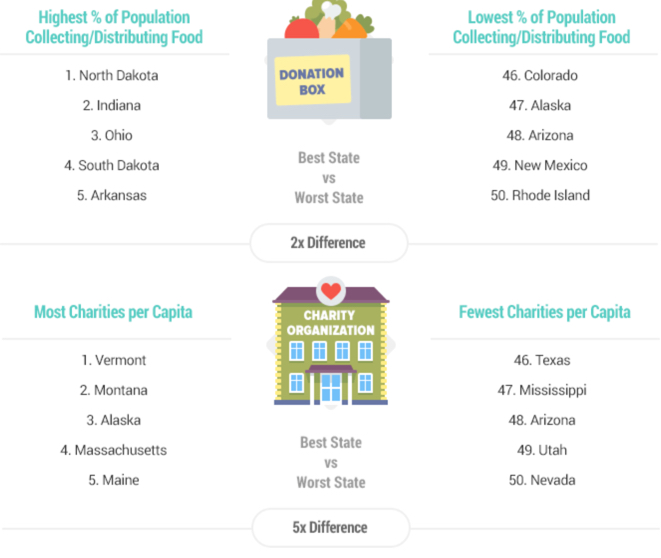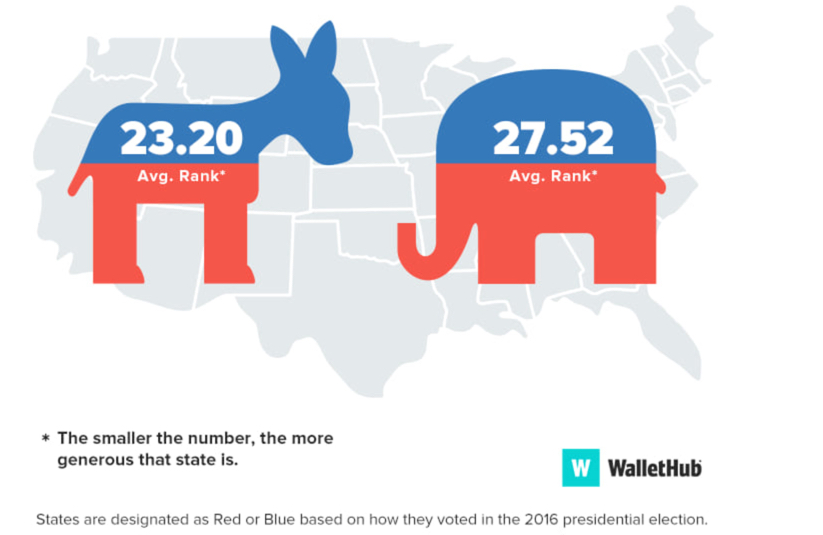Most Charitable Nations. Most Charitable States
Each day we’re deluged with the updated stats on disease and death from the Coronavirus pandemic. So, for a change of pace we thought it would be a relief to flip to some stats of a more uplifting variety
The World Giving Index published by the Charities Aid Foundation , reports that for 2019 the U.S. has led the Index as the world’s most generous country. Myranmar is second and New Zealand third. The three measures which make up Index: helping a stranger, donating money and volunteering time.
In addition to giving $449 billion in 2019, 77 million Americans also volunteered a total of 6.9 billion hours for an estimated value of $167 for their service.
These facts along with some mighty interesting state-related tidbits are contained in a just-released study titled Most Charitable States for 2020 prepared by WalletHub, the personal finance website, and summarized by their Financial Writer Adam McCann.
McCann notes, “While the COVID-19 pandemic may have disrupted some volunteer opportunities in 2020, it hasn’t stopped people from giving. In fact, donor grantmaking was up 16% in the first four months of 2020 compared to the same period in 2019.
“Plus, the COVID-19 stimulus will allow Americans to take an above-the-line tax deduction of $300 per person for charitable donations in 2020. [Agitator note: For a detailed explanation of easy tax deductibility because of the pandemic see this piece in the New York Times]
“In the spirit of inspiring altruism, WalletHub determined the most charitable of the 50 states by comparing them across 19 key indicators of charitable behavior. Our data set ranges from the volunteer rate to the share of income donated to the share of sheltered homeless.”
To determine where “the most generous Americans are inspiring others to be more selfless, WalletHub compared the 50 states based what they consider the 19 key indicators of charitable behavior. The data set ranges from the volunteer rate to the share of income donated, to the share of sheltered homeless. (You can find their methodology and more details on rankings here)
Most Charitable States
|
|
| 1. Utah | 11. Alaska |
| 2. Minnesota | 12. Georgia |
| 3. Maryland | 13. Wyoming |
| 4. Oregon | 14. Washington |
| 5. Ohio | 15. New Hampshire |
| 6. Pennsylvania | 16. Arkansas |
| 7. Virginia | 17. North Carolina |
| 8. North Dakota | 18. Wisconsin |
| 9. Maine | 19. New York |
| 10. Colorado | 20. Illinois |
Because The Agitator normally deals in fundraising metrics like retention rates, lifetime value, etc. this WalletHub report is refreshing in terms of a helicopter view of giving and volunteering we don’t often see.
Here are some interesting morsels for your next Zoom call:



RED VS BLUE STATES
And…since we probably won’t excise hyper-partisanship 2020 from our brains for months or years to come, here’s the ranking of giving by Red States vs. Blue States. Spoiler Alert: Blue States gave more.

We should note that this report has lots of goodies –charts, videos, maps—you can embed in your website or on you blog. In addition, if you want to give back instead of receiving, they’ve included a Charity Calculator to help you determine how best to pitch in, depending on your resources and availability. Finally, you can see where their editions think your money will be used most effectively by reading WalletHub’s report on Best Charities for 2021.
We’re giving an Agitator Holiday Raise to the team at WalletHub for their interesting and imaginative take on giving in this strange, but hopeful period.
Roger



For those of you looking for more data on who really gives, there’s a fascinating book on the subject titled “Who Really Cares” available on Amazon here: https://www.amazon.com/Who-Really-Cares-Compassionate-Conservatism/dp/0465008232
I think it’s actually a much more useful study if you want help determining where to focus your efforts (and your budgets).
Spoiler alert: The book’s author has researched a considerable amount of data but came to some different conclusions (and many similar ones too).
Fair warning:
The author of that book is a conservative. So, be prepared for that if you find yourself disinterested in other perspectives and conclusions based on alternative research.